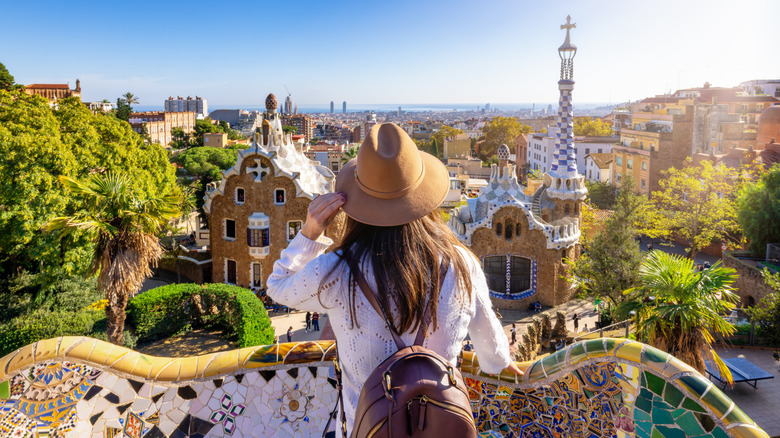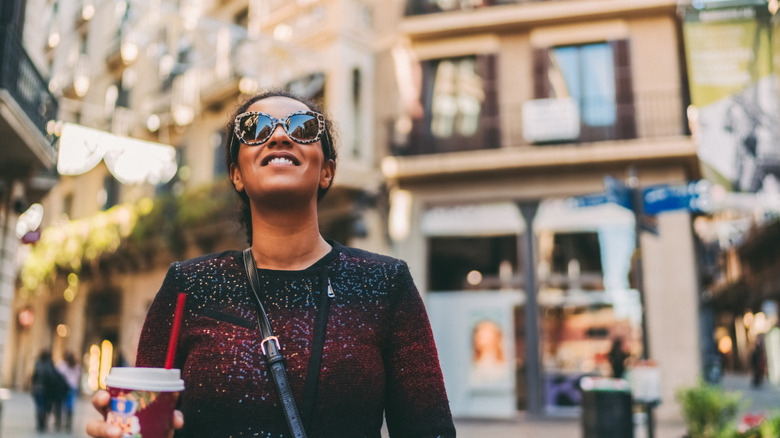The Popular European Country Where Solo Female Travelers Are Most Likely To Be Catcalled On The Street
One Sunday in 2021, a male student at a university in Madrid threw open the window at his all-male student residence and began hurling explicit insults and abuse at the all-female residence hall across the way. A mob of male students quickly joined in, jeering and chanting with him. The incident, caught on camera, went viral for the blatant display of sexual harassment of female students. It was widely condemned with the Spanish Prime Minister weighing in on the verbal assault and it led to a national discussion of whether cat-calling — the sexual harassment of women on public streets — should be made a legal offense.
A 2016 survey by the Jean Jaures Foundation found that Spain reported more cases of so-called wolf-whistling, than Germany, France, the U.K., Italy, and the U.S. A 2021 survey by Plan International in Spain found that nearly 80% of women respondents had experienced sexual harassment on city streets. In an attempt to counter the problem of gender violence and sexual harassment, Spain passed the "Only Yes Means Yes" law in 2022, aimed at tougher penalties, including fines for cat-calling and sexual harassment. So, what should solo female travelers know about planning a trip to Spain?
Spain is a favorite destination for solo women travelers
Overall, solo female travelers find Spain to be a safe country. The Women's Danger Index, compiled by journalists Asher and Lyric Fergusson in 2019, named Spain as one of the safest countries for female travelers. "Spain is incredibly safe for solo female travelers," writes Jackie Rezk in her blog, Jou Jou Travels, "Of course, like all other countries, you do have to use your common sense. Don't wander down back alleys, especially after dark, keep an eye on any drinks you order, and make sure you carry your belongings as close to your person as possible."
Nonetheless, cat-calls, wolf-whistles, and other unwanted attention are something that female travelers may experience in Spain. The country's traditional macho culture was once known for "piropos" – a flirtatious remark or comment made by men to women often unsolicited. While it still exists, unsolicited expressions of piropos are on the decline and often frowned upon. Spain's football federation president, Luis Rubiales, was convicted of sexual assault, for example, when he swept up Spain's star striker in the women's team with an unwanted kiss after their World Cup victory in 2024. Adding to the furor, video footage showed Rubiales making vulgar gestures during the match while seated next to Spain's Queen Letizia.
Tips for traveling solo in Spain
Spain is not the only country with laws against cat-calls and wolf-whistles. In Europe, France, Belgium, and Portugal can issue fines for street harassment while other countries are considering legislation. In general, Spain and Europe are considered safe destinations for women travelers. In particular, the German capital of Berlin was recently ranked as the best destination for solo travelers.
Spain remains a favorite destination for many solo women travelers, such as Rachel Elizabeth, who has made several trips across the country. "I walked around Madrid and Barcelona alone and was not always hyper-focused on safety either, and I never once felt at risk," she wrote in her travel blog Blond Wayfarer, "Of course, I'm not suggesting that you leave your common sense behind as soon as you cross the Spanish border. I would be remiss if I didn't mention pickpocketing in this post, however. At the end of the day, your belongings are in more danger than you."
For a safe trip, it's best to do your research and look for solo travel tips from other women travelers. Interestingly, Europe's historic sites also offer some unique opportunities for solo travelers. One of the best-kept secrets in Europe, says travel pro Rick Steves, is to stay in a monastery or convent, and Spain has quite a few to check out.


